World
Joe Biden, America’s oldest sitting president, needs young voters to win again. Will his age matter?
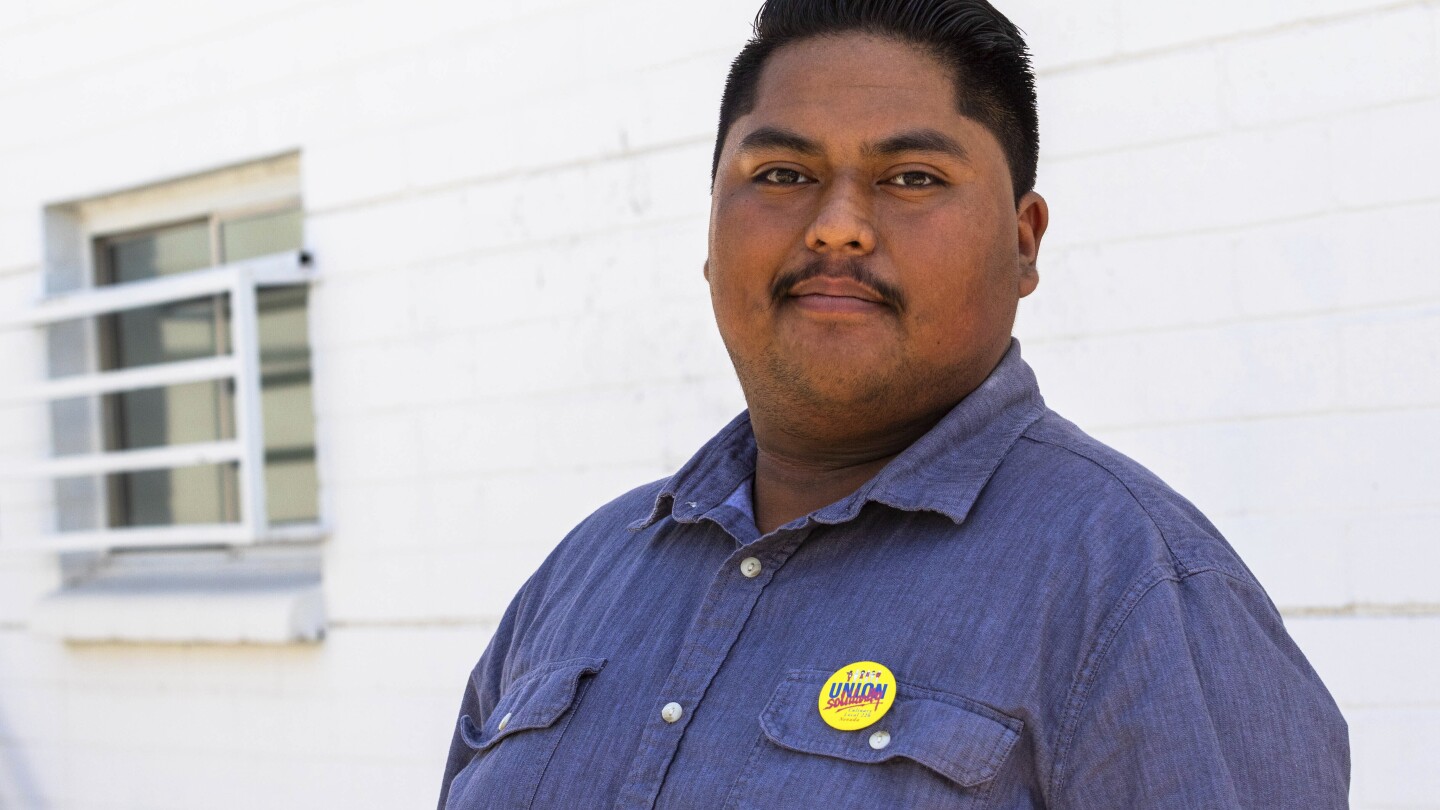
At 24, Alberto Rodriguez has grandparents younger than Joe Biden. But he’s more interested in the 80-year-old president’s accomplishments than his age.
“People as young as me, we’re all focusing on our day-to-day lives and he has done things to help us through that,” Rodriguez, a cook at Mandalay Bay Resort and Casino in Las Vegas, said of Biden’s support among young voters. Rodriguez pointed specifically to federal COVID-19 relief payments and government spending increases on infrastructure and other social programs.
Voters like him were a key piece of Biden’s winning 2020 coalition, which included majorities of young people as well as college graduates, women, urban and suburban voters and Black Americans. Maintaining their support will be critical in closely contested states such as Nevada, where even small declines could prove consequential to Biden’s reelection bid.
His 2024 campaign plans to emphasize messages that could especially resonate with young people in the coming weeks as the anniversary of the sweeping Inflation Reduction Act approaches in mid-August. That legislation includes provisions that the White House will embrace to argue that Biden has done more than any other president to combat climate change.
Such efforts, however, could collide with Biden’s personal reality — like when he recalled that, while attending a St. Patrick’s Day parade at age 14, he appeared in a photo with President Harry S. Truman.
“Purely by accident — I assume it was an accident — the photographer from the newspaper got a picture of me making eye contact with Harry Truman,” Biden said to chuckles last week at the Truman Civil Rights Symposium in Washington.
In 2020, 61% of voters under age 30 — and 55% of those between 30 and 44 — supported Biden, according to AP VoteCast, a nationwide survey of the electorate.
It’s an age group with which Republicans hope to make inroads. Former President Donald Trump, who is the early front-runner in the GOP presidential primary and is only 3 1/2 years younger than Biden, said Friday, “We are hitting the young person’s market like nobody’s ever seen before.”
Kevin Munoz, a spokesman for Biden’s campaign, referred to Trump’s “Make America Great Again” movement in arguing that “young people are acutely impacted by the issues front and center in this election, driven by the extreme MAGA agenda.” He said that included inaction on climate change, gun violence and student debt.
“We will meet younger Americans where they are and turn their energy into action,” Munoz said in a statement.
That might not defuse questions about age, though, when it comes to Biden or Trump.
“There’s a frustration and exhaustion that they feel with the rematch,” Terrance Woodbury, co-founder & CEO of the Democratic polling firm HIT Strategies, said of young voters.
“That’s more of a problem than either of those two candidates individually, is that a system can just keep reproducing,” Woodbury added. “And I think a lot of people just find that untenable.”
An April poll from The Associated Press-NORC Center for Public Affairs Research found that just 25% of Democrats under 45 said they would definitely support Biden in a general election, compared with 56% of older Democrats. A majority of Democrats across age groups said they would probably support him as the party’s nominee, however.
Biden’s campaign is relying heavily on the Democratic National Committee, which during last year’s midterms, hired campus organizers in Pennsylvania, Wisconsin, Michigan, Arizona and other battleground states and offered weekly youth coordinating meetings to encourage in-class contacts and “dormstorms.” The DNC sees young people as some of the most critical voters it will need to reach in 2024 and promises “significant investments” to mobilize them. Plans are underway to expand on its work last cycle, including trainings it held on how best to turn out voters.
The Republican National Committee is trying to use Biden’s age against him, posting online videos of Biden seeming frail or making verbal gaffes, such as when he declared in June “God save the queen,” nearly nine months after the death of England’s Queen Elizabeth II.
Rodriguez shrugged off online attacks, “People can make all the hit pieces and memes and TikToks all they want.”
A starker contrast might be between the president and rising Democrats such as 46-year-old California Rep. Ro Khanna and Transportation Secretary Pete Buttigieg, 41, one of Biden’s primary rivals in 2020. Neither seriously entertained running for the White House in 2024 and have backed Biden’s reelection.
“The only thing that really matters is your ability to do the job,” Buttigieg, who was 37 when he launched his 2020 presidential bid, said recently on CNN. Khanna told Fox News Channel that age will “obviously” be a 2024 factor, but suggested that Biden’s staff “overprotects” him and “the more he’s out there, the better.”
Other top young Democrats have lined up to back Biden. Florida Democratic Rep. Maxwell Frost, who was elected to Congress last year at 26, is on the Biden campaign’s advisory board, as is Maryland Gov. Wes Moore, 44. New York Rep. Alexandra Ocasio Cortez, 33, recently endorsed Biden.
Chicago Mayor Brandon Johnson, a progressive who says strong turnout among young voters helped him win a runoff election this spring, said Biden’s policies transcend his age. Johnson noted that the president’s work “around climate justice speaks not just to this generation, but generations to come.”
“The excitement that I believe that we’re going to have is going to speak to the incredible work and organizing that we are committed to doing as a party,” said Johnson, 47. “And we’re looking forward to working with the president over the course of his next four years.”
Still, Randi Weingarten, president of the American Federation of Teachers, acknowledged that even the president’s supporters understand how demanding the White House can be.
“People worry about Joe Biden. They worry like you would worry about a beloved father or grandfather,” said Weingarten, 65. “What you normally hear from Democrats is this sense of, ‘OK, I just want him to be OK.’ And you’re hearing just the consternation of, ’This is a hard job.’”
Biden said he “took a hard look” at his age while deciding to seek a second term. But he’s also tried to suggest his age and experience are assets rather than liabilities by joking repeatedly about them. That’s a departure from 2020, when Biden called himself a “transition candidate” and pledged to be a “bridge” to younger Democrats.
Santiago Mayer, the founder of Voters of Tomorrow, which has 20-plus chapters nationwide and works to increase political engagement among young voters, argues that Biden is not defying his past promise by running for reelection, but keeping it.
“He just needs more time,” said Mayer, who graduated from California State University at Long Beach in May. “I think the second term is a very important part of that pledge. He’s building a progressive future for young people and he can’t actually pass the baton until that’s done.”
One key policy piece of Biden’s efforts to appeal to young voters, providing student debt relief, was recently struck down by the Supreme Court. The White House has launched a new effort, but it will take longer.
“Of course it’s going to dampen some of that because people are disappointed,” Weingarten said of the ruling’s effect on enthusiasm for Biden. But she said the decision could also motivate young Biden supporters anxious show their support for the president’s alternative plan.
“It is also about the fight,” Weingarten said “not just about the results.”
___
AP polling director Emily Swanson in Washington contributed to this report.

World
Eight Takeaways: How Israel Weakened Civilian Protections When Bombing Gaza

An investigation by The New York Times has found that Israel, in the weeks after Hamas’s Oct. 7 attack, severely undermined its system of safeguards to make it easier to strike Gaza, and used flawed methods to find targets and assess the risk to civilians.
The Israeli military acknowledged changes to its rules of engagement but said they were made in the context of an unprecedented military threat and always complied with the laws of war.
Here are some of the main takeaways from the investigation.
Raised threshold of civilian harm per pre-emptive strike
In previous conflicts with Hamas, Israeli officers were usually only allowed to endanger fewer than 10 civilians in a given strike. In many cases the limit was five, or even zero.
At the start of this war, the Israeli military increased that threshold to 20, before reducing it in certain contexts a month later. Strikes that could harm more than 100 civilians would also be permitted on a case-by-case basis.
Expanded list of targets
Israel vastly increased the number of military targets that it proactively sought to strike. Officers could now pursue not only the smaller pool of senior Hamas commanders, arms depots and rocket launchers that were the focus of earlier campaigns, but also thousands of low-ranking fighters as well as those indirectly involved in military matters.
Removed limits on how many civilians could be put at risk each day
The military leadership briefly ordered that its forces could cumulatively risk killing up to 500 civilians a day in preplanned strikes. Two days later, even this limit was lifted, allowing officers to conduct as many strikes as they deemed lawful.
Struck too fast to vet all targets properly
The pace of the bombing campaign was one of the most intense in 21st-century warfare, which officers said made it far harder to vet targets properly. Israel dropped or fired nearly 30,000 munitions into Gaza in the first seven weeks, at least 30 times more than the U.S.-led coalition fired in the first seven weeks of its bombing campaign against ISIS.
Used a simplistic risk assessment
Israel often used a simplistic statistical model to assess the risk of civilian harm: It regularly estimated the number of civilians in a building where a target was believed to be hiding by using a formula based largely on the level of cellphone usage in the surrounding neighborhood.
Dropped large, inaccurate bombs
In previous wars, the air force would often use a “roof knock,” a smaller munition to give civilians some time to flee an imminent attack. From the first day of this war, Israel significantly reduced its use of roof knocks. The military also sometimes used less-accurate “dumb bombs,” as well as 2,000-pound bombs.
Used AI to propose targets
Israel used an artificial intelligence system in a widespread way for the first time. It helped officers analyze and sign off on targets exponentially more quickly, increasing the number of targets that officers could propose each day.
Delayed strikes
Hours often passed between when an officer vetted a target and when the air force launched a strike at him. This meant strikes often relied on outdated intelligence.
World
Incoming Trump admin, Congress showdown looms with South Africa over support for Russia, US foes
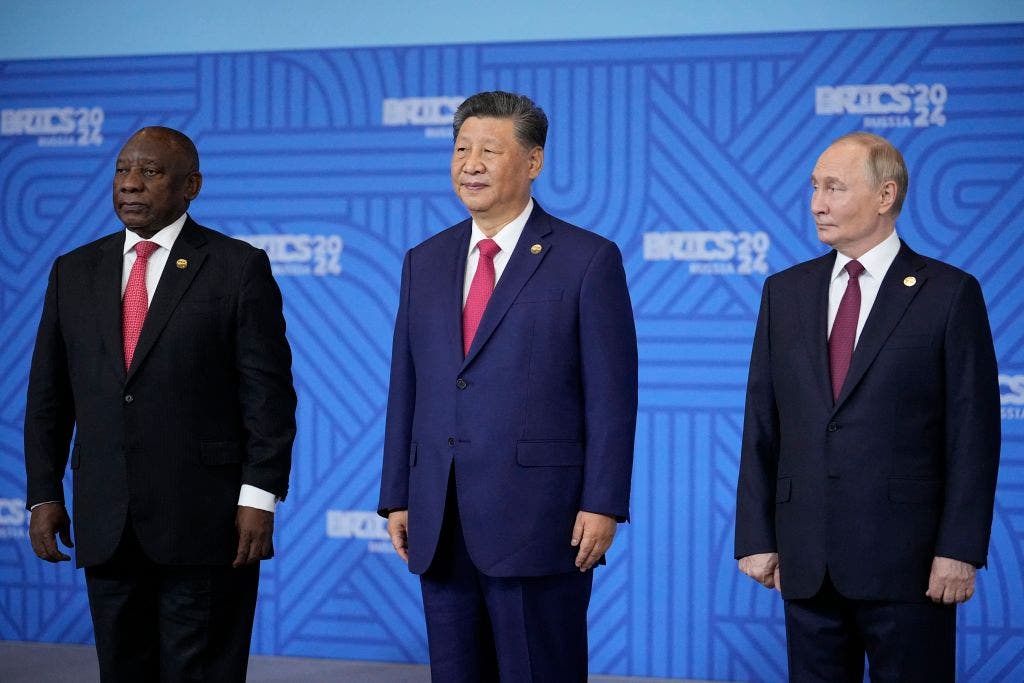
JOHANNESBURG – Key Republicans are already pressing the incoming Trump administration to kick South Africa out of lucrative trade arrangements, should the South African government not change its position on Russia, China, Iran and Israel.
Most at risk is South Africa’s duty-free exports to the U.S. of items such as cars and citrus fruit under AGOA – the African Growth and Opportunity Act, and with it the potential loss of tens of thousands of African jobs. South Africa is likely to be under intense scrutiny from the incoming administration.
A publication from the Center for African Studies at Howard University, in 2023, warned that a country wanting AGOA’s preferential trade agreements “cannot act in a manner that undermines U.S. national security or foreign policy interests”.
South Africa joins Russia’s military aircraft and naval vessels on exercises, allowing Pretoria’s naval bases to be used by the Kremlin and Russia’s sanctioned warships. Senior South African military officials have received training in Moscow. At the U.N., South Africa has refused to condemn Russia’s invasion of Ukraine.
BIDEN TRAVELS TO AFRICA WHERE POLICIES WERE ‘OVER-PROMISED AND UNDER-DELIVERED,’ AMID MASSIVE CHINA EXPANSION
President-elect Trump (Peter Kramer/NBC via Getty Images)
South Africa’s majority ANC party has met with terror group Hamas, and recently one branch of the ANC supported a local Muslim leader who reportedly shouted to a cheering crowd, “I am Hamas, Cape Town is Hamas, Viva Hamas!” The government also issued a statement condemning the killing this year of Hamas leader Ismail Haniyeh. The country’s foreign minister, Ronald Lamola, spoke out against the “assassination” of this designated terrorist leader, saying “such acts of extrajudicial killings violate international law.”
South Africa has accused Israel of genocide at the International Court of Justice.
South Africa’s biggest trading partner is China, with the two countries being founder members of the BRICS trade organization. South Africa has welcomed the inclusion now of Iran in BRICS. There have been accusations of deep links between Tehran and Pretoria.
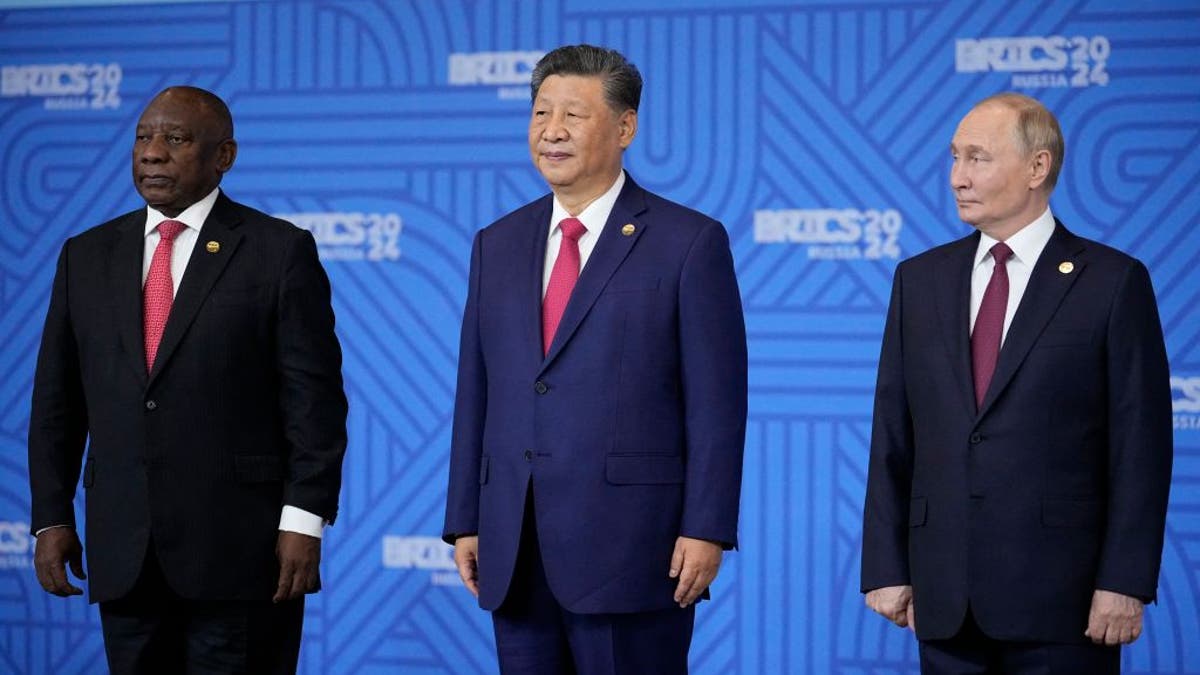
South African President Cyril Ramaphosa, Chinese President Xi Jinping and Russian President Vladimir Putin during the BRICS summit in Kazan on Oct. 23, 2024. (Alexander Zemlianichenko/Pool/AFP via Getty Images)
“Given the South African positions on the Russia-Ukraine and Mideast conflicts, South Africa is leaning away from American positions in a number of ways, most especially in its vigorous pursuit of Israel and its leaders in the international courts,” J. Brooks Spector told Fox News Digital.
Spector, a former U.S. diplomat now based in Johannesburg, and deputy editor of the respected Daily Maverick, added that “continuing action and rhetoric by South Africa in its pursuit of Israel in international court efforts will, however, encourage Republicans in Congress (and probably in the administration as well) to strip South Africa of benefits under the African Growth and Opportunity Act, assuming the act is renewed next year.”
BIDEN-HARRIS ADMIN ACCUSED OF ‘TOO LITTLE, TOO LATE’ TO SAVE THE PEOPLE OF WAR-TORN, FAMINE-STRICKEN SUDAN
“Such pursuits by the South African government may also lead to efforts to cut back on assistance to important efforts such as PEPFAR – the aid program that, together with the Global Fund and local organizations, has been crucial in the country’s successful efforts combatting HIV and AIDS.”
One such leading Republican, Sen. Jim Risch of Idaho, ranking member of the Senate Foreign Relations Committee, told Fox News Digital, “I remain concerned about South Africa’s efforts to cozy up to Russia, China and Iran, including Iran’s terror proxies, and the impact this has on U.S. national security – a vital element in AGOA eligibility. The country’s foreign policy actions will remain a focus of my oversight efforts.”
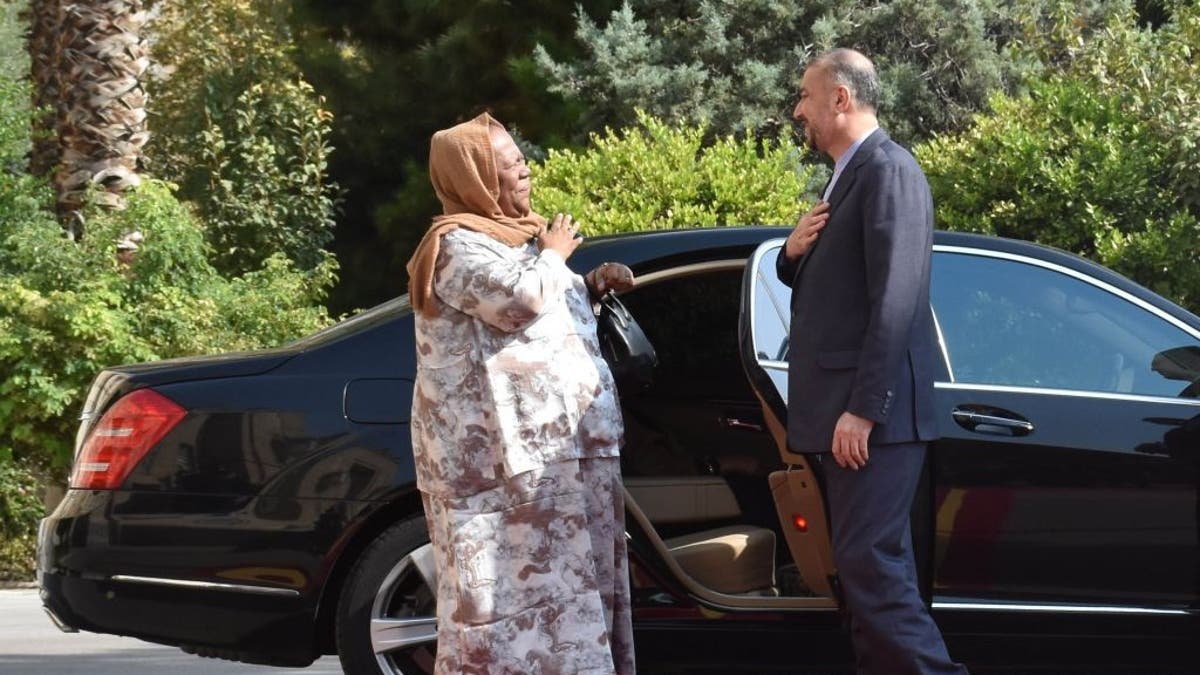
Naledi Pandor, minister of international relations and cooperation of South Africa, and Hossein Amir-Abdollahian, minister of foreign affairs of Iran, meet in Tehran on Oct. 22, 2023. (Haydar Sahin/Anadolu via Getty Images)
Sen. Tim Scott, R-S.C., ranking member of the Senate Foreign Relations Subcommittee on Africa and member of the Senate Finance Committee, slammed South Africa in 2023, “South Africa has harbored sanctioned Russian ships, expanded relations with Iran and issued statements against Israel’s right to defend itself following Hamas’ recent terror attacks”
Both of these influential Republican leaders are expected to become more powerful when President-elect Trump takes office in January, with Scott’s office staff telling Fox News Digital, “Sen. Scott looks forward to working with the Trump administration to ensure that AGOA participants are not undermining our national security interests.”

The now deceased Hamas leader Khaled Meshaal at a rally in his honor on Oct. 21, 2015, in Cape Town. South Africa. (Rodger Bosch/AFP via Getty Images)
South Africa’s moves are very definitely in an extremely bright spotlight in Washington. From inside the beltway, Richard Goldberg told Fox News Digital he’s worried particularly over potential links between South Africa and Iran. Goldberg is a former member of the National Security Council, and a senior adviser at the Foundation for Defense of Democracies. He told Fox, “The first step is to build the case publicly, and give South Africa one last moment of choosing. We should declassify intelligence about South Africa’s deep relationship with Iran, and any other support or partnership with terrorist groups.”
Goldberg continued, “And then we need to use our full diplomatic and economic weight to force Pretoria to choose between the United States and our terrorist adversaries. AGOA should be one of several items on the policy menu.”
South Africa’s Department of International Relations didn’t respond to several requests for comment. But COSATU’s Parliamentary Co-ordinator, Matthew Parks did. COSATU is the Confederation of South African Trade Unions, historically aligned with President Cyril Ramaphosa’s ANC party. Parks is highly respected for his meaningful and dignified pursuance of workers’ rights. His members have much to lose, including potentially their jobs, if South Africa is pushed out of AGOA. But he appeared to be cautiously optimistic when talking to Fox News Digital, “We are confident that our relations with the U.S. will continue to grow, including through AGOA, simply because it is to the benefit of both our peoples.”
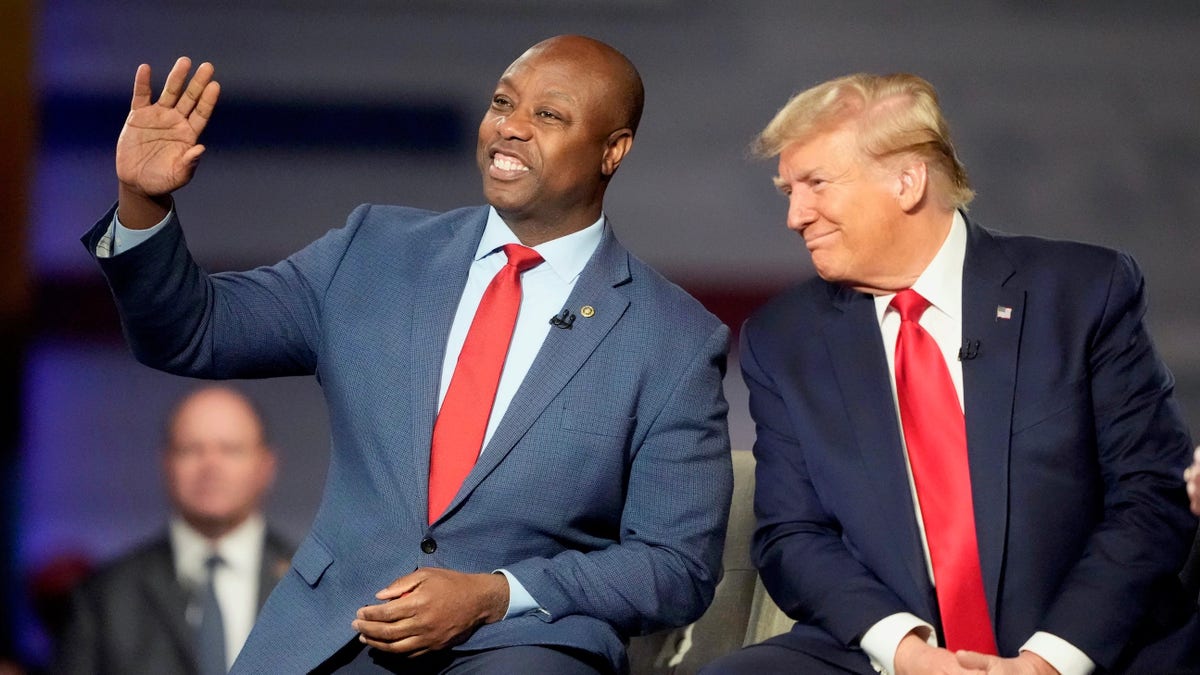
Sen. Tim Scott and former President Trump during a Fox News Channel town hall on Feb. 20, 2024, in Greenville, South Carolina. (AP Photo/Chris Carlson)
“We’ve been extensively involved in engagements between South Africa and the U.S., on how to deepen our relations and toward the renewal of AGOA,” Parks continued. “We’ve engaged extensively with our colleagues in the U.S. labor movement, business community, Congress (both Republicans and Democrats), the State Department, Department of Labor, NSC and the White House.”
As Trump moves into the White House, nearby Ebrahim Rassool will be starting his second term as South African ambassador to the U.S. This month he talked to the Daily Maverick on South Africa’s challenges with the new administration, referring to South Africa’s attack on Israel at the ICJ. “We will stick by the case, but let us now trust our legal team,” he said, “trust the evidence that we have placed in front of the judges of the ICJ, trust the judges of the ICJ to come to a sustainable, just solution – but that we need to put away the megaphone now.”
THOUSANDS OF CHRISTIANS ‘DELIBERATELY TARGETED’ AND KILLED IN NIGERIA, NEW REPORT SAYS
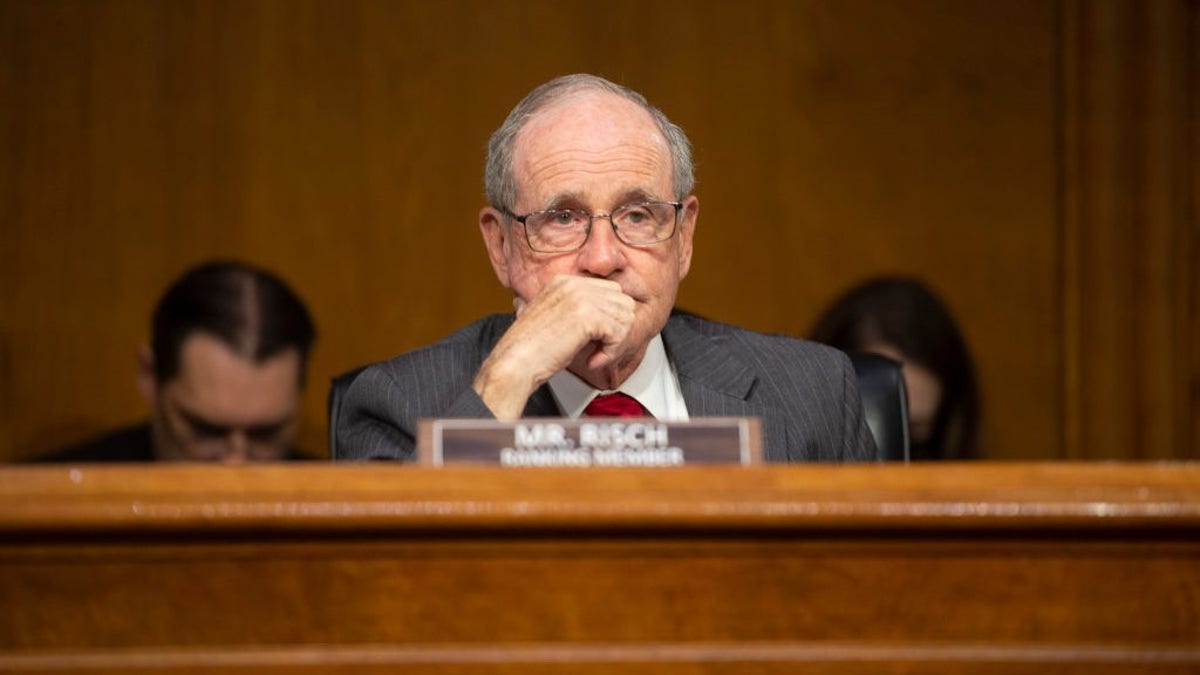
Sen. Jim Risch during a Senate Foreign Relations Committee hearing at the U.S. Capitol on April 26, 2022. (Bonnie Cash-Pool/Getty Images)
Rassool pointed out that the South African oranges exported to the U.S. under AGOA enabled Americans to drink orange juice all year round, when Florida and California oranges were out of season.
And Rassool added, “Why would you want to punish America with expensive cars when the BMWs coming from South Africa are going to be much cheaper than getting them from Germany or manufacturing your own?
“Likewise, to point out that American cancer patients are receiving medical nuclear isotopes that come from South Africa.”
The expulsion of South Africa from AGOA would be “disastrous,” Renai Moothilal wrote in the Business Day newspaper last year. Moothilal is CEO of the National Association of Automotive Component & Allied Manufacturers, and wrote, “It will be no surprise if some component manufacturers close their doors. U.S.-headquartered multinational manufacturers with plants here may exit the South African country if there are volume losses linked to our exclusion from AGOA, or other forms of political pressure are brought to bear.”
Observers note there are loud threats coming from President-elect Trump himself, including a claim that he will slap a 100% import tariff on countries like South Africa if, as members of BRICS, they adopt a new currency to rival the dollar. In the other corner of the ring, South African politicians are taking a more placatory and reserved tone. The Democratic Alliance or DA is South Africa’s main opposition party. But since May, they have also been members of the government of national unity, working in a sometimes noisy coalition with President Ramaphosa’s ANC.

The Russian frigate Admiral Gorshkov docked in the Cape Town harbor, Feb. 14, 2023, en route to naval exercises with the South African and Chinese Navy. (AP Photo/Nardus Engelbrecht)
Emma Powell, the DA’s national spokesperson for foreign affairs, told Fox News Digital that it’s likely the relationship between Pretoria and Washington “will become increasingly transactional, with greater emphasis placed on equitable reciprocity. This would contrast the Biden administration’s approach to beneficiation-based investment and development. There is also likely to be less tolerance for any action on the part of the South African government that may be perceived as undermining the national security interests of the United States.”
Powell added “the Trump administration is also likely to take a more cautious approach on AGOA eligibility.”
J. Brooks Spector told Fox News Digital he could take home one strong positive: “The incoming U.S. president’s often-expressed support for transactional foreign economic policies may possibly be an incentive for Africa’s nations – urged on by South Africa – to come together with initiatives offering trade and market concessions in Africa to America.”
World
2024: Top 10 defining moments in the European Parliament

From crucial votes on nature and migration, to powerful speeches and hard debates: the year saw drama and upheaval in the Eurochamber
2024 was a year of change for the European Parliament, shaken up by the elections in July.
Beyond the vote, which significantly modified its composition and balance of powers, here are some moments to remember from this year.
1. Farmers’ protests reach Parliament
The beginning of 2025 was marked by massive protests of farmers across Europe, from Germany and France to Poland and Spain.
Among their targets were the EU’s commercial deal with Mercosur countries – at that time negotiations were still ongoing – and some European environmental policies affecting the agrifood sector.
On 1 February, a thousand farmers from several countries arrived in Brussels. After a night procession on their tractors, they occupied the square in front of the European Parliament for an entire day, burning hay, spreading manure and damaging the square.
2. ‘Stop being boring to defeat Putin’
One of the most powerful and evocative interventions in the European Parliament was Yulia Navalnaya’s in February. She took the floor in the hemicycle in Strasbourg days after her husband, Alexei Navalny, died under suspicious circumstances while imprisoned in Russia.
Navalnaya paid tribute to the opposition leader’s courage and attacked Russia’s president Vladimir Putin, receiving a general standing ovation from MEPs.
“If you really want to defeat Putin, you have to become an innovator. You have to stop being boring,” Navalnaya told MEPs.
“You cannot defeat him by thinking he is a man of principle who has morals and rules. He is not like that. And Alexei realised that a long time ago. You are not dealing with a politician but with a bloody monster.”
3. The final battle on Nature Restoration Law
The Nature Restoration Law, a proposal to gradually rehabilitate the EU’s land and sea areas degraded by climate change and human activity was one of the most contentious issues in the European Parliament in the final part of the legislature.
European People’s Party (EPP) began a full-throttle campaign to bring down the law, arguing it would imperil food production, increase retail prices and devastate the traditional livelihoods of farmers.
EPP talking points were backed by right-wing forces, but fully contested by progressive MEPs, environmental organisations, legal scholars and even multinationals, who said restoring nature was indispensable to maintain a prosperous economy and sustainable supply chains.
The EPP even pressed on with a controversial social media push, going as far as claiming the legislation would turn the city of Rovaniemi, where Santa Claus lives, into a forest.
In February, the Parliament eventually approved a watered-down version of the law with 329 votes in favour and 275 against. It entails the restoration of at least 20% of the EU’s land and sea areas by 2030, and of all ecosystems in need by 2050.
4. The long-sought vote on the major migration policy reform
In April 2024, the European Parliament approved the wide-reaching reform of the European Union’s migration and asylum policy almost four years after the European Commission had proposed it.
The “Pact on migration and asylum” was supported by the three major Parliament groups: European People’s Party (EPP), Socialists and Democrats (S&D), and Renew Europe, albeit with some dissidents.
The right-wing parties, the Greens/EFA and the Left group voted against. The latter even protested outside Parliament before the vote, staging a “funeral for the right to asylum” that it claimed the new rules would usher in.
New rules foresee a solidarity mechanism to share the burdens of welcoming asylum seekers, through a redistribution among the member states which can be replaced with financial contributions. But they also entail stricter border controls and faster procedures for examining asylum requests and carrying out the repatriation of migrants. The Pact will be fully in force from mid-2026.
5. The Parliament backs abortion as an EU fundamental right
Even symbolic votes could cause hard clashes in the European Parliament. In April, the Chamber approved a resolution to include the right to abortion in the Charter of Fundamental Rights of the European Union.
As the topic is very divisive, the Parliament split. The resolution was approved with 336 votes in favour, 163 against, and 39 abstentions. The right-wing groups Identity and Democracy and European Conservatives and Reformists voted against, as did the majority of the centre-right conservative European People’s Party, the largest group of the Parliament.
However, the vote did not have a binding effect. The Charter of Fundamental Rights of the EU requires the unanimous agreement of all member states to be changed. The rules for terminating pregnancy also fall within health legislation, which is the exclusive competence of EU countries.
6. The final rush before the European elections
Members of the European Parliament often run to the last available moment to approve important pieces of legislation. In its last session before the elections, the EP held 89 votes on legislative files, plus seven non-legislative resolutions, marking a record for the entire legislature.
Among them, there were the right-to-repair directive, a regulation to prohibit products made with forced labour on the Union market, new rules for digital platform workers, a bill on packaging reduction, and the first-ever European law against gender-based violence.
7. The ‘Venezuela majority’ in Europe
After the vote, the new European Parliament soon revealed its changed balance of powers, even if in a mostly symbolic vote. In September, the Strasbourg hemicycle voted to recognise Venezuela’s exiled presidential candidate Edmundo González Urrutia as the “legitimate and democratically elected president”.
The resolution, which carried no legal weight, was backed by the centre-right European People’s Party (EPP), the right-wing nationalist European Conservatives and Reformists (ECR) and the newly formed far-right Patriots for Europe, marking the first time in the new legislature that mainstream conservatives joined ranks with the more right-wing groups.
This alliance was renamed the “Venezuela majority”, following the subject of the vote, and resurfaced during the decision to award González and Venezuela’s opposition leader María Corina Machado the Parliament’s Sakharov Prize for Freedom of Thought.
8. Von der Leyen vs Orbán: showdown in the Parliament
The first October plenary session saw a fiery debate pitching European Commission President Ursula von der Leyen against Hungary’s prime minister Viktor Orbán, who took the stage in the European Parliament a few months after a controversial visit to Moscow made while Hungary occupied the rotating presidency of the Council of the EU.
The war in Ukraine was one of the bones of contention, with the Hungarian leader claiming that the EU had adopted a mistaken policy on the war and the Commission president launching a personal attack on him without mentioning his name: “There are still some who blame this war not on the invader but on the invaded.”
9. The unpopular approval of the European Commission
At the end of November, the European Parliament definitively approved the College of Commissioners led by Ursula von der Leyen. But while the vote on the Commission’s President herself in July was a success for von der Leyen, she could barely celebrate the approval of the College.
In November, only 370 MEPs voted in favour, representing 54% of all votes cast and 51% of the total number of members, 719.
Several defections came from among the centre-right European People’s Party, the centre-left Socialists and Democrats and the liberal Renew Europe, lowering support for the Commission, which was “saved” by the votes of part of the European Conservatives and Reformists and the Greens/EFA group.
Indeed, for one reason or another, only one in two lawmakers has endorsed the new College of Commissioners.
10. Weirdness and oddities in the Eurochamber
2024 also witnessed some surreal moments during the debates in the Parliament: a dog barking in the hemicycle, an Irish MEP insulting an Italian football club, and a Slovak MEP releasing a dove as a gesture of peace.
-
/cdn.vox-cdn.com/uploads/chorus_asset/file/24924653/236780_Google_AntiTrust_Trial_Custom_Art_CVirginia__0003_1.png)
/cdn.vox-cdn.com/uploads/chorus_asset/file/24924653/236780_Google_AntiTrust_Trial_Custom_Art_CVirginia__0003_1.png) Technology5 days ago
Technology5 days agoGoogle’s counteroffer to the government trying to break it up is unbundling Android apps
-

 News6 days ago
News6 days agoNovo Nordisk shares tumble as weight-loss drug trial data disappoints
-

 Politics6 days ago
Politics6 days agoIllegal immigrant sexually abused child in the U.S. after being removed from the country five times
-

 Entertainment7 days ago
Entertainment7 days ago'It's a little holiday gift': Inside the Weeknd's free Santa Monica show for his biggest fans
-

 Lifestyle6 days ago
Lifestyle6 days agoThink you can't dance? Get up and try these tips in our comic. We dare you!
-

 Technology1 week ago
Technology1 week agoFox News AI Newsletter: OpenAI responds to Elon Musk's lawsuit
-
/cdn.vox-cdn.com/uploads/chorus_asset/file/25672934/Metaphor_Key_Art_Horizontal.png)
/cdn.vox-cdn.com/uploads/chorus_asset/file/25672934/Metaphor_Key_Art_Horizontal.png) Technology2 days ago
Technology2 days agoThere’s a reason Metaphor: ReFantanzio’s battle music sounds as cool as it does
-

 News3 days ago
News3 days agoFrance’s new premier selects Eric Lombard as finance minister

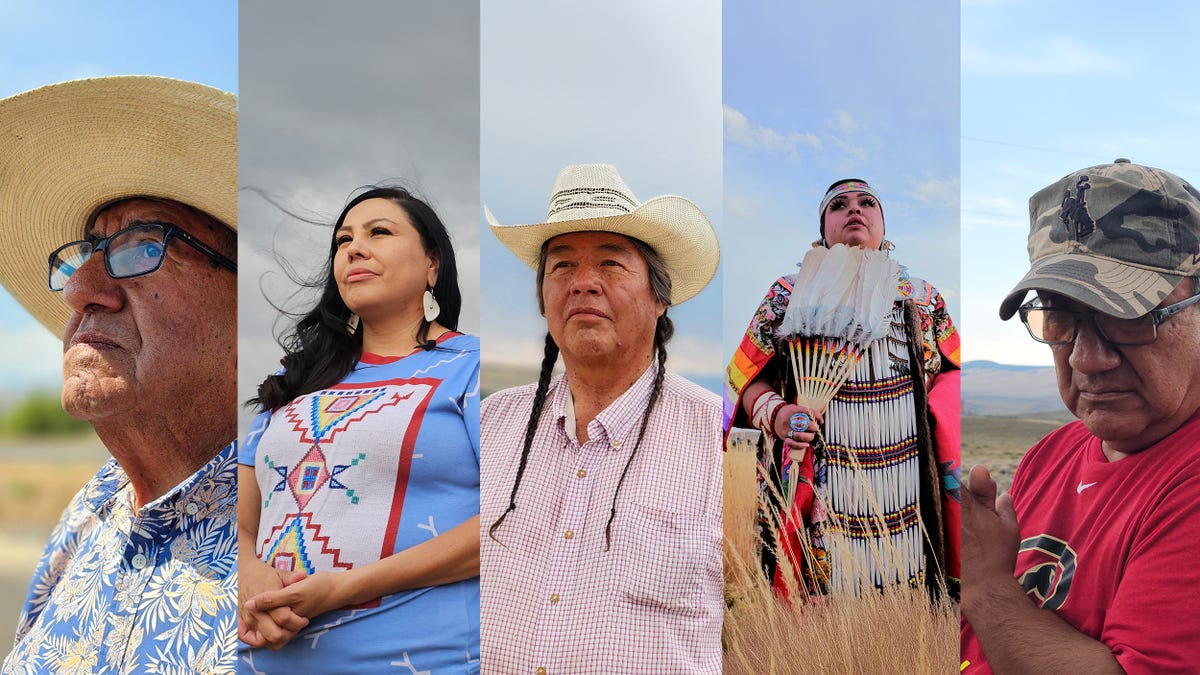



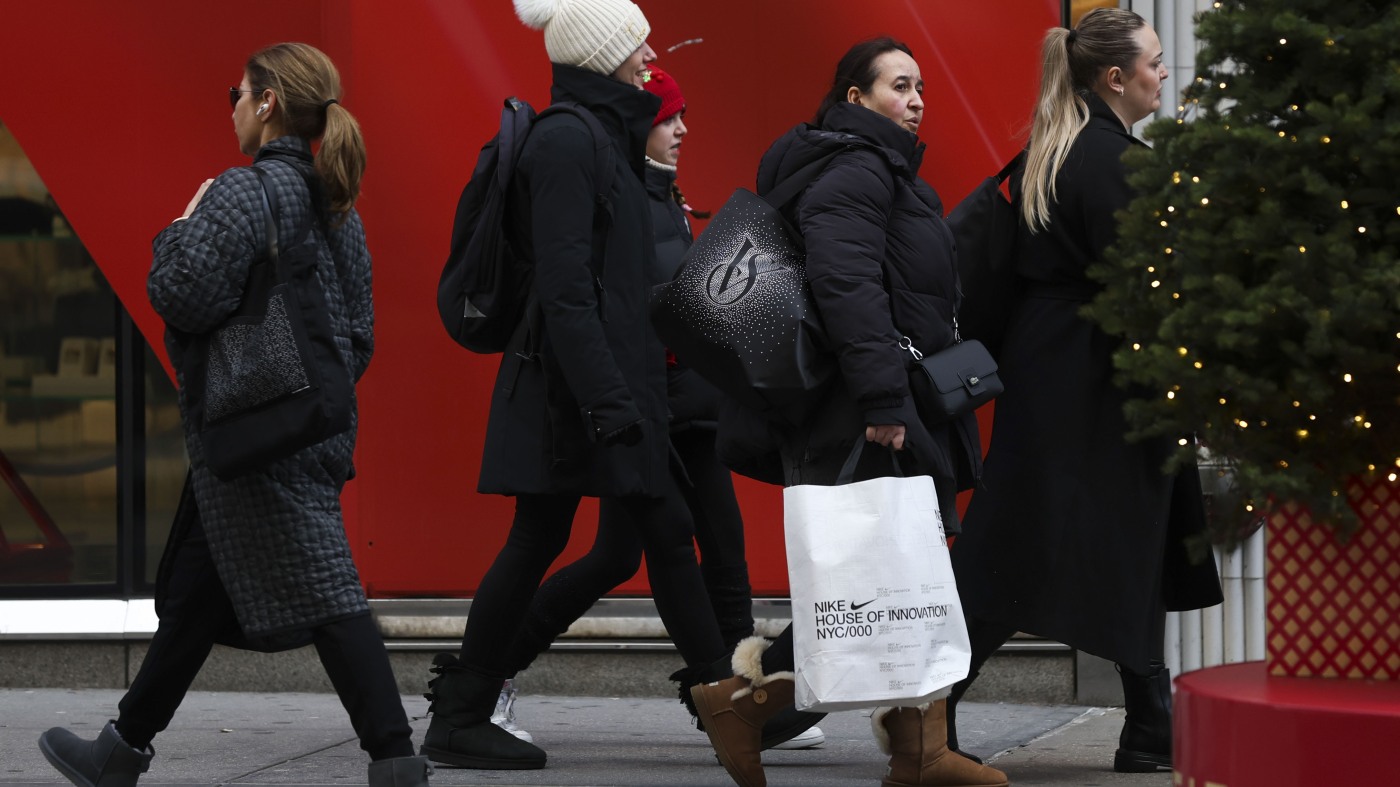
/cdn.vox-cdn.com/uploads/chorus_asset/file/25742882/DSC_1384_Enhanced_NR.jpg)








